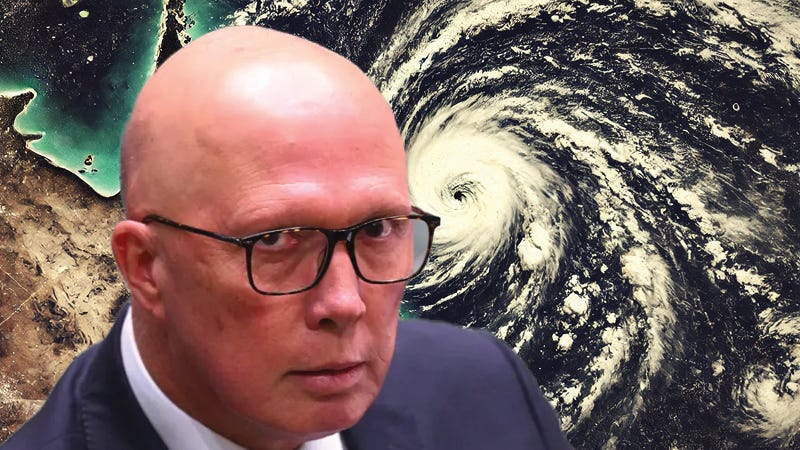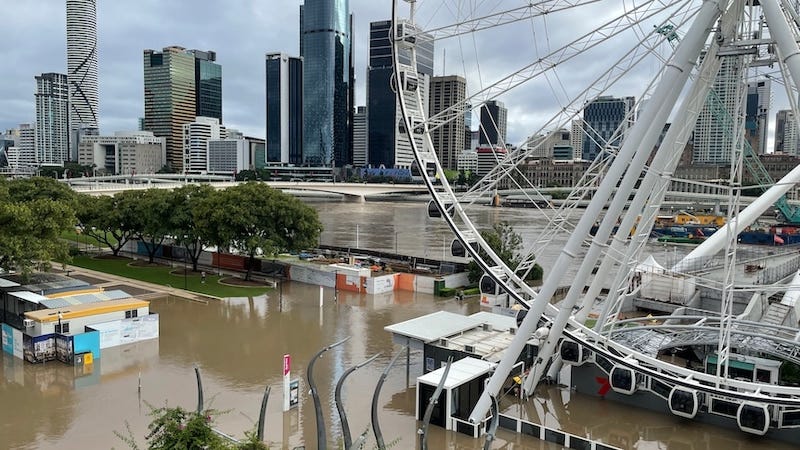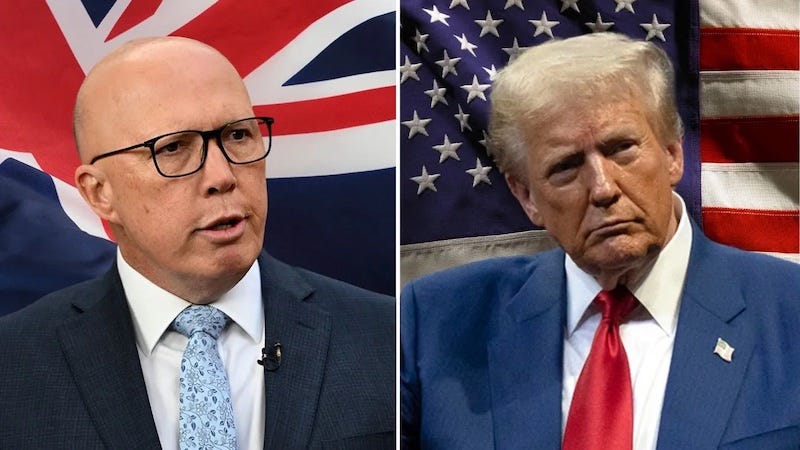The diary of Dutton’s disaster: How a cyclone exposed a leadership crisis
The mismanagement of a natural disaster has seriously dented the Liberal Party’s chances of an unlikely win at the federal election.
When Cyclone Alfred first appeared off the coast of Queensland a few weeks ago, warnings echoed across media platforms, emergency services sprang into action and Brisbane braced itself, with authorities urging precautions and distributing sandbags. Initially classified as a serious Category 4 cyclone, Alfred weakened into a tropical low by the time it reached Queensland’s coast and although it inflicted flooding and substantial rain, the damage was less catastrophic than expected and, unfortunately, this outcome provided ammunition to conspiracy theorists and right-wing pundits, eager to dismiss safety preparations as needless and “woke” measures, misrepresenting basic meteorological facts – erroneously claiming cyclones were somehow inherently less dangerous than hurricanes (in fact, cyclones, hurricanes, and typhoons are the same weather phenomena, simply named differently in various parts of the world).
As if to replicate entering the eye of the cyclone, into this unfolding drama walked opposition leader Peter Dutton: initially quick to criticise and allege the federal and Queensland governments were underestimating the storm, Dutton’s position soon took a politically damaging turn for the worse. Instead of remaining in his Dickson electorate – exactly where leadership visibility and empathy were urgently needed – he abruptly departed Brisbane and flew directly into a political storm of his own making. His decision: to attend an exclusive Liberal Party fundraising event in Sydney, hosted by billionaire hospitality magnate Justin Hemmes at his lavish Vaucluse mansion.
Hemmes, whose Merivale hospitality empire has drawn notoriety for chronic wage underpayments amounting to $19.4 million, sexual assault controversies within his venues, and even a disgraceful incident involving a video of a sexual assault at a company awards event in 2017, represented an ethical and political liability for any public official – particularly one in Dutton’s position. By choosing to be seen soliciting political donations alongside Hemmes during a critical moment of crisis in his home state, Dutton committed the first major error of a series that would ultimately expose deep flaws in his political judgement and leadership abilities.
When Sunrise host Natalie Barr confronted him on the optics of leaving Queensland during a natural disaster to attend such a controversial fundraiser, Dutton deflected toward an attempted comparison to Labor’s funding sources: “We’ve got a fundraiser,” Dutton claimed, “I don’t have the millions of dollars coming from the CFMEU and the other unions and the Prime Minister attends fundraisers”. While it is true that Anthony Albanese attended a small fundraising event in Sydney on the same day as Dutton – and this is not to condone Albanese’s activities – at least he was en route to the cyclone-affected region near Brisbane, rather than flying away from the area, as Dutton did.
Dutton then shifted blame onto Albanese and Treasurer Jim Chalmers, accusing them of exploiting a natural disaster for political gain – however, this had an opposite effect, reinforcing the perception that his priorities are misplaced and out-of-touch. As opposition leader, Dutton has both a platform and a clear opportunity to assert himself positively. As the old political saying goes, never let a good crisis go to waste.
Instead, he chose party fundraising. This decision revealed Dutton’s deeper weaknesses: a failure to read the public mood, an inability to discern priorities, and a troubling comfort with aligning himself alongside ethically compromised benefactors.
Dutton also ignored a basic principle of crisis leadership clearly illustrated by his predecessor Scott Morrison. During Australia’s bushfire season in 2019/20, Morrison went off to a secret holiday in Hawaii, a profound political misjudgement that ultimately ruined his prime ministership. Morrison’s later mishandling of emergency funding during the 2022 Northern New South Wales floods – allocating aid selectively to politically sympathetic electorates – also highlighted the poor choice of mixing partisan politics with disaster relief. These recent examples are lessons in political mismanagement during a crisis, lessons Dutton should have understood deeply yet failed to take.
His defensive response – “I’d prefer public funding but that’s how the rules are written” – did little to lessen the political damage. Instead, it amplified his perceived tone-deafness, failing to acknowledge that the rules governing political fundraising do not mandate attending exclusive events at controversial billionaires’ mansions precisely when one’s constituents are facing significant hardship.
This contrast between what Dutton could have done versus what he actually did opens up many questions about his leadership: that his decision-making framework is flawed and geared towards personal self-preservation and political calculation rather than genuine community need and principled leadership. The optics alone – his electorate inundated while he mixed with billionaires – would have been disastrous enough, but compounded by the ethical cloud hanging over Merivale, Dutton had essentially handed his political rivals powerful ammunition to use against him which, of course, they are now happily applying.
His misguided actions during Cyclone Alfred set off a chain reaction that reverberated powerfully, beginning with scathing public criticism, followed by growing internal party unease, declining polling, and culminating in widespread questioning of his suitability for leadership.
Politics before people
The uncomfortable truth of disaster management in politics is that perception often becomes reality. Even politicians who may privately lack empathy or genuine concern typically recognise the need to visibly prioritise the community’s welfare during crises. Leaders don’t necessarily have to perform heroic feats or dramatically transform the outcome of a disaster, but they do need to demonstrate care, empathy, and genuine concern – even if that concern for some politicians is primarily performative. Voters recognise, consciously or subconsciously, the presence of genuine empathy versus blatant opportunism, and Dutton’s abrupt departure to Sydney, just hours after condemning the government’s disaster response as inadequate, shattered this basic principle.
Politically, this act was reckless and indefensible. Even the simplest political instinct could have guided him towards wiser choices – where were his advisers, and what else could Dutton have done? He could have briefly visited affected communities, publicly assessing the situation and expressing solidarity, before excusing himself once satisfied that emergency services had the crisis under control. Alternatively, he could have dispatched Deputy Leader Sussan Ley – that’s what deputies are for – to represent him at the fundraiser, citing pressing responsibilities at home. Such actions would have demonstrated political awareness and common sense, reinforcing the public’s confidence that their leaders prioritise community safety above partisan or financial interests.
This also represents not just personal failing but a larger, structural issue within the Liberal Party (and the Liberal–National Party in Queensland). Certainly, this is just the one issue, but the persistent influence of factions and ideological rigidity has repeatedly led the Liberals to choose leaders whose political instincts are not aligned with public sentiment. The rise of community independents in traditionally Liberal electorates is a clear response to this issue and despite their philosophical alignment with core liberal principles, community independents gained traction precisely because voters felt abandoned by a party unwilling or unable to prioritise key community concerns, especially regarding climate change and environmental disasters.
Cyclone Alfred symbolised more than a weather event – it marked a growing awareness that extreme weather events are no longer rare or isolated. Climate change is reshaping expectations about disaster management, and communities demand more proactive, empathetic, and competent leadership from politicians across the spectrum. Residents of Brisbane, previously insulated from cyclone threats, now face a reality where cyclones venture further south, even reaching Coffs Harbour and potentially threatening areas once thought safe. The notion that such disasters are inherently politicised or “woke” trivialises genuine fears held by everyday Australians – voters increasingly frustrated by politicians dismissing their concerns and prioritising political advantage over decisive climate action and emergency preparedness.
The evolving threat landscape demands a new era of political leadership – one built on the fundamental understanding that disaster management must transcend partisan rivalry. Politicians need to rise above their immediate political interests and grasp the urgent reality that their communities’ safety and long-term wellbeing depends on cohesive, non-partisan approaches. In failing to grasp these foundational political truths, Dutton exposed himself not merely as a poor political tactician, but as emblematic of a broader political culture that Australians are rapidly losing patience with – one which prioritises private fundraising and short-term political advantage over genuinely serving the public good.
Dutton is unsuccessfully channeling Trump’s tactics
Dutton’s recent political actions also indicate a pattern of behaviour that is strongly reminiscent of Donald Trump’s disruptive tactics in American politics. Mimicking Trump, Dutton has often positioned himself as the political saviour, announcing unlikely solutions and outcomes that are detached from reality, even boldly declaring that he also could secure an exemption for Australia from the U.S.-imposed 25 per cent tariffs on steel and aluminium, even though no other nation has been able to achieve this. Of course, this is all possible, but is it likely? Probably not.
Much of Dutton’s approach is rooted in the Trump-style belief that confidently repeated falsehoods will eventually be perceived as truths. This was apparent in his response to Cyclone Alfred, his fundraising debacle, and now the tariff issue. Yet, unlike Trump, who at least enjoyed initial success with his strategy, Dutton struggles to resonate even within his own base. His attempts at political posturing and exaggerated confidence appear hollow, increasingly exposing him as disconnected and self-deluded rather than authoritative or inspiring. Trump’s populist appeal derived from his charisma and outsider status; Dutton possesses neither – he’s been a political insider for almost 24 years and lacks the bizarre entertainment value of Trump. Instead, his efforts to replicate Trump’s rhetorical playbook amplify his shortcomings – mainly, a chronic lack of political insight and an alarming absence of genuine policy substance.
The mainstream media has long asserted that Prime Minister Albanese is under sustained political pressure – which is true – and that this situation is paving the way for Dutton to win the next federal election, even to the extent of already designating him as Australia’s 32nd Prime Minister. However, contrary to these media assertions, it is Dutton, and not Albanese, who faces mounting political pressure, which will certainly carry through to an election campaign period, which is due to be announced soon.
Even with all the support that has been provided by the mainstream media, Dutton’s attempts at Trumpian populism are failing to gain traction. Australians largely reject Trump’s style of brash, self-centred leadership, seeing clearly through the façade. Australian politics are different to the U.S. – the political climate that enabled Trumpism in America exists on a much smaller basis in Australia, a country wary of political extremism and personality-driven politics. The electoral can be fooled sometimes, but not to this level.
Dutton’s deluded self-confidence also becomes clearer in his misguided alignment with Trump and American Republican ideals, believing that emulating Trump’s assertiveness could win Australian voters. However, Trump’s political strategy never included genuine policy coherence or international awareness. Infamously ignorant of Australian strategic assets like Pine Gap, and even unaware of the AUKUS agreement, Trump’s ignorance contrasts with Dutton’s self-image as an authoritative figure on foreign policy. Dutton’s belief that emulating Trump – who neither understands nor cares about Australia (which should be obvious after the imposition of the 25 per cent tariff on Australian steel and aluminium) – could deliver him electoral success reveals profound strategic confusion and desperation.
For Australian democracy, the lesson is clear: politicians such Dutton, who prioritise self-promotion over genuine leadership and substantive policy, inevitably fail – they may gain some initial success, as former prime ministers Tony Abbott and Scott Morrison did, but, ultimately, they will fail. Until both the Liberal Party and the Australian media confront their roles in promoting hollow politics and misleading narratives, Dutton’s Trumpian illusions will persist – there’s only a few more weeks before the next federal election will be called, and it’s too late to make tactical changes – and this will weaken Australia’s democratic discourse and undermining meaningful opposition at a critical time for the nation’s political health.











